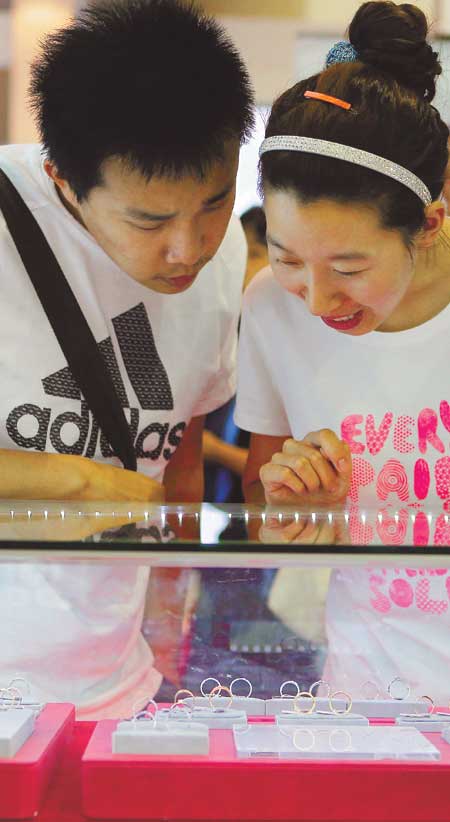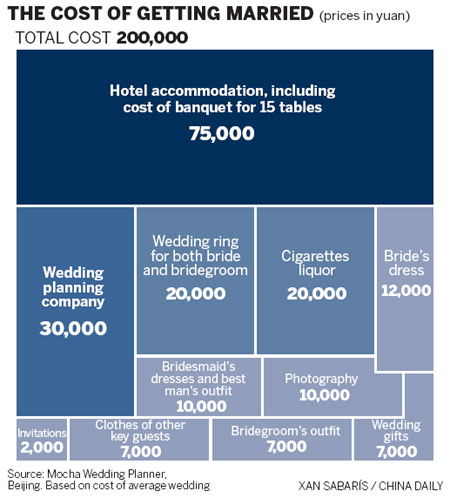Economy
Big day becomes big business
By Andrew Moody and Du Juan (China Daily)
Updated: 2010-09-13 09:21
 |
Large Medium Small |
A woman, accompanied by her fianc, excitedly examines platinum and gold wedding rings on show at the Beijing Wedding Expo. Wang Jing / China Daily
Expenditure on weddings growing at a rate of 20% a year

BEIJING - Getting married is big business in China. Young couples are splashing out on their big day as never before.
While a generation ago, those tying the knot made do with a small function at a dimly lit backstreet restaurant, the 11.7 million couples who got married last year spent 450 billion yuan on much glitzier events, according to the Committee of Wedding Service Industries of the China Association of Social Workers and Tsinghua University.
The benefit to the economy as a whole goes way beyond this with young couples buying and furnishing new marital homes, providing a total boost of 1.500 trillion yuan.
This level of expenditure, which is growing by 20 percent a year, has spawned a whole new industry with an estimated 20,000 companies providing specialized wedding services from those selling cakes and diamond rings to dedicated wedding planning companies.
Many of these are relatively small enterprises which benefit from favorable tax treatment as the Chinese government attempts to push more of the economy into the service sector.
Shi Kangning, director general of the Committee of Wedding Service Industries (CWSI), which oversees the sector, said young Chinese couples just want a great day.
"They don't care how much they spend. They just want as creative and stylish a wedding as possible," he said.
"It doesn't compare with 20 or 30 years ago. In the 1980s, many people had been used to severe poverty and just to have a feast at a restaurant was a major event. Now people can have a feast every day of their lives."
The average expenditure on a wedding is now 200,000 yuan, according to Mocha Wedding Planner, a Beijing wedding planning company, but many spend much more.
Some are influenced by Chinese movie stars such as Tony Leung and Carina Lau who reputedly spent $1 million on their wedding in Bhutan two years ago.
Pan Teng, sales director of wedding planning company Hua Hai Ge, based in Beijing but with outlets across China, said young couples wanted a very different wedding from their parents.
"Many young Chinese people come back from studying overseas and want their own style. They don't really want a traditional wedding with flowers and cars but something very different," he said.
Bride-to-be Bi Luming, 27, and her fianc Chu Zichao, also 27, who were looking for ideas for their wedding at the recent Beijing Wedding Expo at the Beijing Exhibition Center, are typical of China's young marital generation.
The couple, who both work as managers for the same real estate firm, intend to spend up to 80,000 yuan on their wedding in Beijing, to which they plan to invite around 300 people.
Bi said she has friends who help arrange weddings so the couple will not be hiring a dedicated wedding planner.
She added she wanted to have a traditional wedding but with something of a personal twist.
"We actually want a theme of the sea with the main color being blue or purple. This is because we started our relationship in a seaside resort and thought it appropriate. I think we are looking at having blue decorations in the restaurant and maybe blue lights," said Bi.
One of the biggest expenditure items could be the rings they exchange.
"I really don't care how much money I spend on the rings because it stands for love," said Chu.
Rings are certainly a central part of many couple's weddings and one company that gets 70 per cent of its business from selling them is online jeweler zbird.com.

The company was formed by Xu Lei, 36, and his sister Xu Xiao, 33, in 2002 and now has 280 employees.
Its customers browse the company's website for rings they might like and then typically visit one of its "experience clubs", usually located in office buildings rather than retail malls, to make purchases.
Xu Lei said customers typically spend between 8,000 and 25,000 yuan but one customer splashed out 300,000 yuan 15 months ago.
"The wedding market is very important to us. More and more couples want to buy online because they bypass the situation you often find in stores where sales personnel make a judgment about what they can afford. With us they can choose what they like without having any sort of embarrassment," he said.
One company that has also benefited from the boom in weddings is Loves Cake, which has two outlets in Beijing.
The company, which employs 13, was founded 10 years ago as a general cake shop, but decided in 2007 to focus on wedding cakes. A typical cake costs between 2,000 and 3,000 yuan but its most expensive creation was 20,000 yuan.
"Although the wedding market is growing fast, we see it as just at the beginning of really taking off," said Wang Yubin, the company's creative director.
Wang added couples were prepared to spend money on a cake that was special to them.
"The artistic element is only one part of a successful cake. What matters to people is the uniqueness of the product. They want it to say something about them," he said.
Wang is confident his company could become a substantial business on the back of the rise in the expenditure on weddings.
"I think that is a possibility. We still need time to develop and we want to grow at a pace where we maintain control of the business," he said.
Whereas their parents would be happy with beer and baijiu, young Chinese couples want to serve fine international wines.
Teresa Tao is chief executive of Along Wine Industry, a leading Beijing wine merchant and retailer.
She estimates that 30 to 40 percent of its annual turnover of at least 100 million yuan is down to the wedding market.
She said the average wedding order was between 60 and 100 bottles at between 100 and 200 yuan each. Some, however, spend much more.
"People generally want wine at their wedding rather than liquor. They also don't want to serve a cheap bottle. Chinese people like to serve the best for their relatives," she said.
"Younger people getting married tend to be more knowledgeable about wine. They also prefer international brands rather than Chinese ones."
Shi, of the CWSI, said the desire to have an individual wedding was partly the result of the country's one-child policy, which began in the late 1970s
Diao Huijia, a 25-year-old clerk and her future husband, Xu Yao, 25 and an assistant to a general manager of a State-owned company, are one Beijing couple who certainly want their own style.
At their wedding, which will be held outdoor, they will hire calligraphers to write messages on the wall.
"We want a wedding with character which is both romantic and quiet," said Diao.
Shi, of the CWSI, insisted it was this desire to have a wedding with a creative touch that was the fuel driving the wedding services market.
"That is the reason the industry is growing so fast. There is no limit to creative things so it can grow bigger and bigger with a large number of companies entering the sector," he added.




